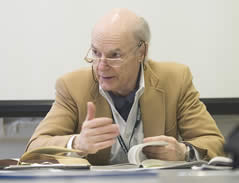Pondering the Study of Education
If, as Arthur Levine and other critics say, graduate education programs too often stress irrelevant academic research at the expense of more practical, clinical instruction, don't just blame education schools: Perhaps it's the way universities structure the study of education.
So contends Robbie McClintock, the John L. and Sue Ann Weinberg Professor in the Historical and Philosophical Foundations of Education. In "Homeless in the House of Intellect," a 105-page essay being distributed in booklet form by the Laboratory for Liberal Learning (New York, 2005), McClintock argues that scholarly research and teaching about education should be separated from the professional training offered by education schools.
"The blurring of academic and professional purposes causes grave weaknesses in schools of education," McClintock writes.
McClintock
and Levine share a concern about the over-academization of today's
graduate education programs. Aspiring principals and superintendents in
doctoral programs are earning a scholarly degree with little relevance
to their jobs, while much of the research they produce is of poor
quality, McClintock writes.
But while Levine is arguing
for a distinction in degrees - creating a more clinically oriented
master's degree and a more scholarly doctorate -- McClintock would like
to see the study of education added to departments in the arts and
sciences. Meanwhile, education schools would focus on professional
training for educators.
Modern universities are typically marked by units that overlap but retain distinct functions: a department of biology and school of medicine; a sociology department and school of social work; a department of economics and a business school. In this atmosphere, the study of education is an anomaly, McClintock writes.
Addressing scholars and administrators in his essay, he envisions "a field akin to political science, in order to secure a place for disinterested academic research and teaching about education at the graduate and undergraduate levels." McClintock discusses why he believes universities have been hurt by the present setup and what they would gain by bringing education into the "house of intellect."
Ultimately, McClintock seeks to provoke debate on two questions: What knowledge, skills and understandings should professional educators have and how can schools of education ensure that they acquire them? And should the dissertation be replaced by a clinical internship like that for medical doctors?
McClintock concludes by outlining the concept of "formative justice" as an alternative way to discuss educational issues. Put simply, formative justice would frame issues in terms of fully developing every individual's potential, in contrast to the current emphasis on "distributive justice," which seeks to allocate finite resources - funds and teachers, for example - to achieve the best result.
In his 37 years at Teachers College and Columbia University, McClintock has explored the juncture of education and history, technology, social science and philosophy. To help foster a national discussion on improving the study of education at research universities, he is organizing a conference for late March or early April 2006.
Establishing an academic department of education would not require a massive investment, McClintock said in an interview. "I think it's much more prudent to start small and let the natural development of quality drive any expansion in size."
Interested readers can order "Homeless in the House of Intellect through amazon.com and barnesandnoble.com by keying "Robbie mcclintock" as author or "0976367203" as the ISBN. For more information on McClintock's upcoming conference, click on to the "Planning" tab at the Web site sponsored by the Laboratory for Liberal Learning Web site, http://studyplace.ccnmtl.columbia.edu
Published Friday, Mar. 11, 2005
